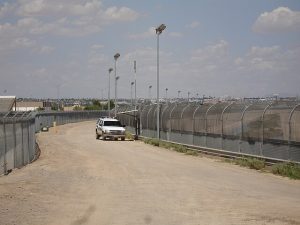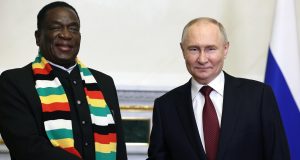Trump signs executive order to end US birthright citizenship.
4 min readTrump’s executive order says the US Constitution has always excluded from birthright citizenship persons born in the United States but not “subject to the jurisdiction thereof.” How has this been defined?
US President Donald Trump signed a list of executive orders on his first day in office, many of which could have implications for non-Americans. The most prominent of these is the order to end birthright citizenship for children whose parents lack legal status.
Within hours of Trump signing the order, he was sued by immigrant and civil rights advocates, including the American Civil Liberties Union.
What is birthright citizenship in the US?
Very simply, birthright citizenship is a legal principle under which citizenship is automatically granted to individuals upon birth.
Presently, in the US, there are two forms of birth-related citizenship: ancestry-based citizenship and birthplace-based citizenship. The latter, also called jus soli, a Latin term meaning “right of the soil”, grants unrestricted citizenship based on place of birth. The second is restricted ancestry-based citizenship, also called jus sanguinis, which extends citizenship to children born abroad to US citizens.
What the US Constitution says
The US Constitution’s Fourteenth Amendment guarantees birthright citizenship, stating that “all persons born or naturalized in the United States, and subject to the jurisdiction thereof, are citizens of the United States and of the state wherein they reside.”
The 14th Amendment was brought in after the Civil War in 1868, essentially meant to ensure that America-born children of formerly enslaved people got American citizenship.
Trump’s executive order goes on to explain his interpretation of the Constitutional provision. “The privilege of United States citizenship is a priceless and profound gift. The Fourteenth Amendment states: “All persons born or naturalized in the United States, and subject to the jurisdiction thereof, are citizens of the United States and of the State wherein they reside.”……..But the Fourteenth Amendment has never been interpreted to extend citizenship universally to everyone born within the United States.”
This line is key: The executive order says the Fourteenth Amendment has always excluded from birthright citizenship persons who were born in the United States but not “subject to the jurisdiction thereof.”
Who are people not “subject to the jurisdiction” of the US
According to Trump’s executive order, people not subject to the jurisdiction of its Constitution fall into two categories: first when a person’s mother was unlawfully present in the United States, and the father was not a United States citizen or lawful permanent resident at the time of the person’s birth. The second category is for when the mother’s presence in the United States at the time of the child’s birth was lawful, but temporary. For example, but not limited to, if the mother was visiting the United States under the Visa Waiver Program or visiting on a student, work, or tourist visa; and the father was not a United States citizen or lawful permanent resident at the time of the person’s birth.
Also in Explained | Explained: With Donald Trump in office, the challenges for New Delhi
Trump’s executive order also goes on to emphasise that the definitions of sex are traditional in this order. This means that when the term “mother” is used in the executive order, it would mean “immediate female biological progenitor”, while “father” would mean the “immediate male biological progenitor”.
Who is most likely to be impacted?
According to 2024 data by the Pew Research Center, “The US foreign-born population reached a record 47.8 million in 2023, an increase of 1.6 million from the previous year. This is the largest annual increase in more than 20 years, since 2000.”
“In 2022, Mexico was the top country of birth for immigrants who arrived in the last year, with about 150,000 people. India (about 145,000) and China (about 90,000) were the next largest sources of immigrants. Venezuela, Cuba, Brazil and Canada each had about 50,000 to 60,000 new immigrant arrivals,” the Pew Research Center report said.

Can Trump do it?
While the order can prompt US federal agencies to interpret citizenship using a more strict and narrow definition, it will run into legal hurdles, which have already been set into motion.
Second, doing away with birthright citizenship would require a constitutional amendment, with a two-thirds vote in both the House of Representatives and the Senate and approval by three quarters of US states. Trump’s party, the Republicans, have a majority in both the House of Representatives, as well as the Senate.
An old promise
Trump’s stand with regard to immigration has been well-documented. As President during his first term, in 2018, Trump had said he intended to remove, by means of an executive order, the right of citizenship from people born in the US to foreign nationals. However, back then, the constitutionality of that kind of an executive order in the absence of a new constitutional amendment had been widely debated. Till the end of his presidency in 2021, no such executive order was passed by Trump.
The issue was back on the table in 2024 during the presidential campaign, and Trump promised to make this his priority on his first day in office. After winning the 2024 elections, during the Presidential transition period, Trump reiterated his campaign promise to end birthright citizenship, without going into details about how he would do so.
In 2024, during an interview with US broadcaster NBC, Trump had said he thought the children of unauthorised immigrants should be deported alongside their parents, even if they were born in the US. “I don’t want to be breaking up families, so the only way you don’t break up the family is you keep them together and you have to send them all back,” he had said during the interview.








